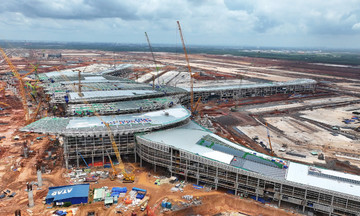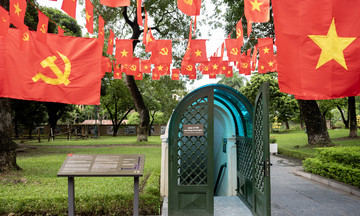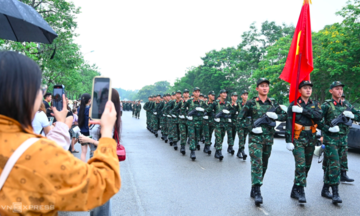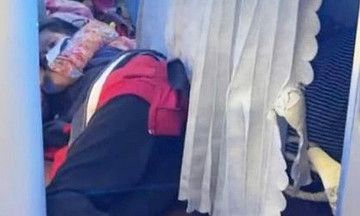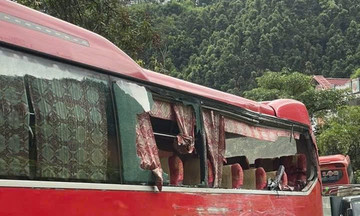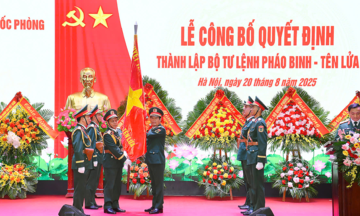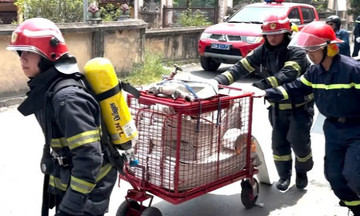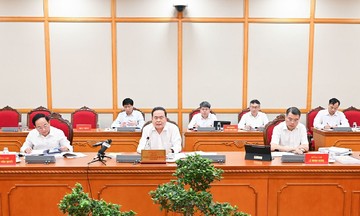The Ministry of Home Affairs is considering awarding the title of Labor Hero to Nguyen Thi Binh, former vice president and former foreign minister of the Provisional Revolutionary Government of the Republic of South Vietnam.
Born Nguyen Thi Chau Sa in 1927 in Quang Nam, Binh’s mother was the second daughter of patriot Phan Chau Trinh, and her father, the tenth son of a Can Vuong (royalist) movement soldier against the French, worked as a surveyor in the southwestern provinces.
In her memoirs, Binh recounted her rural upbringing, learning to farm, fish, and catch shrimp. When her father was transferred to Cambodia, the family moved with him, living in a wooden house on Miche Boulevard in Phnom Penh.
As a child, Chau Sa heard stories from her mother about her grandfather, the patriot Phan Chau Trinh, and the early 20th-century Duy Tan (modernization) movement. Although she never met her grandfather, she inherited a deep love for her country and its people.
Chau Sa attended Lycee Sisowath, Cambodia's largest high school for children of French officials. During recess one day, upon hearing French classmates refer to domestic workers as "thieving Anamites," Chau Sa hit them with her schoolbag.
"My childhood had a lasting impact on my entire life, both socially and personally," Binh wrote.
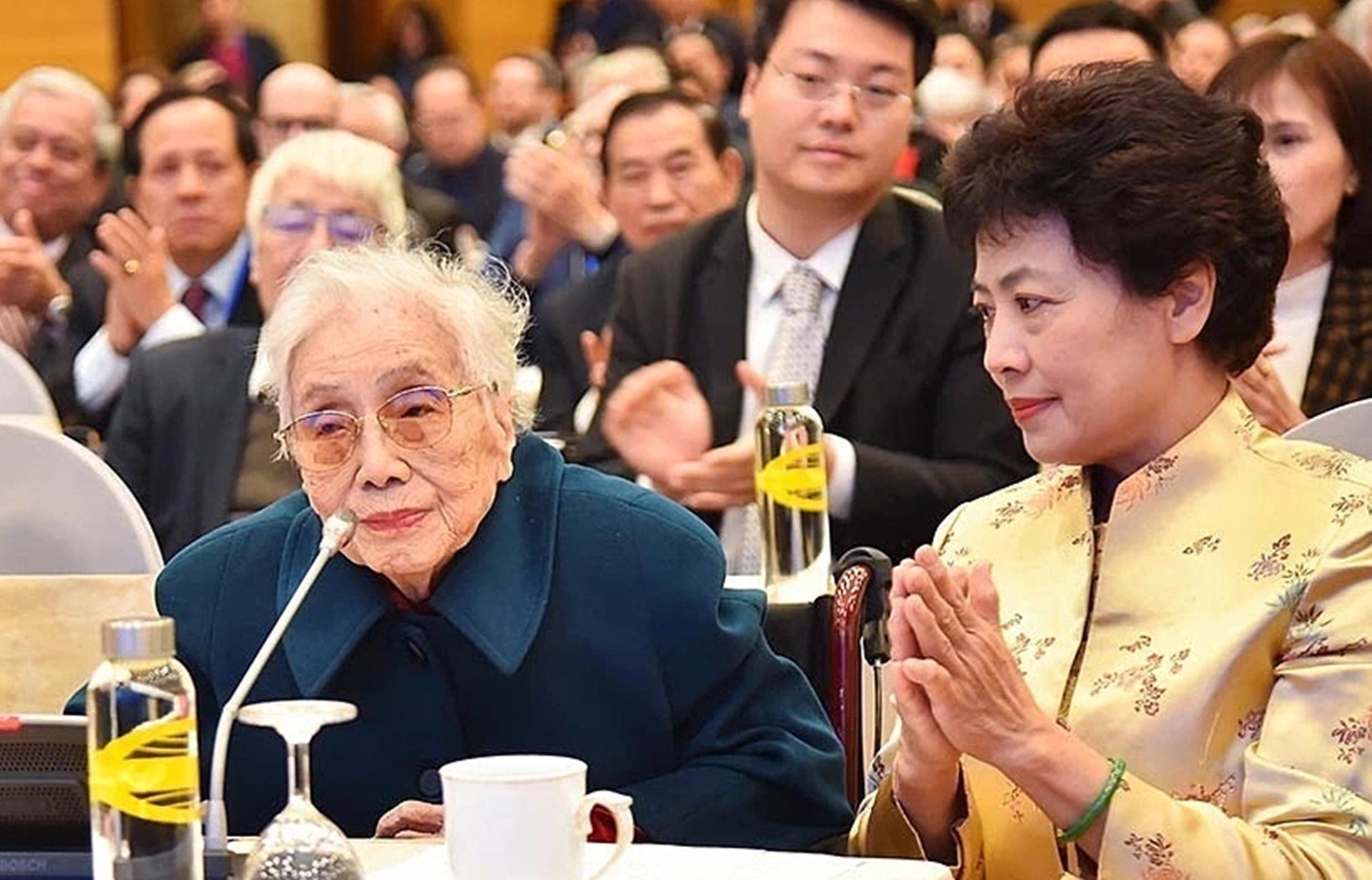 |
Nguyen Thi Binh (left) speaking at the 50th anniversary of the signing of the Paris Peace Accords in Hanoi, 15/1/2023. Photo: BNG
When her mother fell seriously ill and returned to Saigon for treatment, Chau Sa aspired to study medicine and become a doctor for the poor after graduating high school. Following her mother's death, her father placed great hope in her. She excelled academically, particularly in mathematics, and worked as a tutor, teaching math at several schools.
Chau Sa enjoyed the romantic music of Schubert and Schumann, and loved sports, especially basketball. She also learned sewing and cooking, aspiring to be a woman of "talent, beauty, wisdom, and virtue." After the Japanese coup against the French in Indochina in 3/1945, Chau Sa’s family returned to Vietnam, and her high school graduation exams were postponed.
A lifelong love
"My love life was truly the most precious part of my life," Binh once confided, describing herself as "a happy person." In Cambodia, her father, working for the surveying agency, supervised trainees from Hanoi who had graduated from the Bridges and Roads Department of Bach Khoa University. Among them was Dinh Khang, a talented athlete who excelled at table tennis, volleyball, and basketball.
They met on the basketball court, and their feelings blossomed. However, her father was cautious, unsure of Khang's family and wanting his daughter to complete her education.
With the outbreak of the resistance war against the French, Binh returned to Saigon and joined the Viet Minh. In mid-1946, they reunited at the Phan Chau Trinh temple. Khang stayed with Binh’s family for several months before leaving for Hanoi. Before departing, he said: "I have to go north to join the Viet Minh army; I have many friends there. The situation in the south is complex, and it's hard to know what to do." They parted, promising to see each other again soon.
For 9 years, Binh received only a few words from Khang, written on a crumpled piece of paper: "Wishing you and your family safety and good health." She was overjoyed to know he was alive and working in the engineering corps. Despite the distance and the war, and despite receiving advice to reconsider, she resolved to remain faithful unless someone better than Khang came along.
After the victory against the French, Binh regrouped in the north and reunited with her beloved. In late 1954, they had a hasty wedding, as she had to return to Saigon the following month. From then on, despite frequent separations due to work, their love helped her stay strong and fulfill her duties. They had a son and a daughter. "I am a happy person, having married the person I love, and it was also my first love," Binh wrote in her memoirs.
Before leaving for the Paris peace talks, Binh called her husband from the Engineering School in Bac Giang to come and see her. Unsure how to break the news, her husband encouraged her, saying, "You have work to do, just go with peace of mind. I will take care of the children."
Debate between Nguyen Thi Binh and American journalists.
'Peace ambassador' in Paris
In 1961, Binh joined the Reunification Committee, responsible for people-to-people diplomacy for the National Liberation Front of South Vietnam. After years of revolutionary work and holding various positions, in 7/1968, she was appointed as a representative of the National Liberation Front to the Paris Peace Accords, the longest negotiation in world history, lasting from 11/1968 to 27/1/1973.
At 2 PM on 2/11/1968, Binh arrived in Paris wearing a dark pink ao dai (traditional Vietnamese dress), a gray overcoat, and a black scarf with floral accents. Before 400 journalists, she delivered her first speech, outlining the Front's just cause and its desire for a peaceful solution. The journalists were impressed by the small, gentle woman from a war-torn land, who spoke with reason and emotion.
After the preliminary session on 27/11/1968, the four-party conference in Paris on ending the war and restoring peace in Vietnam officially began on 25/1/1969. Binh served as the deputy head of the Front's delegation. For four years, every Thursday, Binh and the two Vietnamese delegations met at the Kleber Conference Center for negotiations.
In 6/1969, with the establishment of the Provisional Revolutionary Government of the Republic of South Vietnam, Binh was appointed foreign minister and head of the Paris delegation, replacing Tran Buu Kiem. "I didn't consider the news of my appointment as minister to be good news, but rather a heavier responsibility," she recounted. From this point on, her role as a "peace ambassador" became even more prominent and impressive.
In addition to preparing for the meetings at Kleber, Binh dedicated considerable time to interacting with the press. There was a period when she met with one or two television stations or reporters from French, American, British, and Japanese newspapers daily. She also traveled to countries like the UK, Italy, Sweden, Bulgaria, Cuba, and various African nations to advocate for peace in Vietnam.
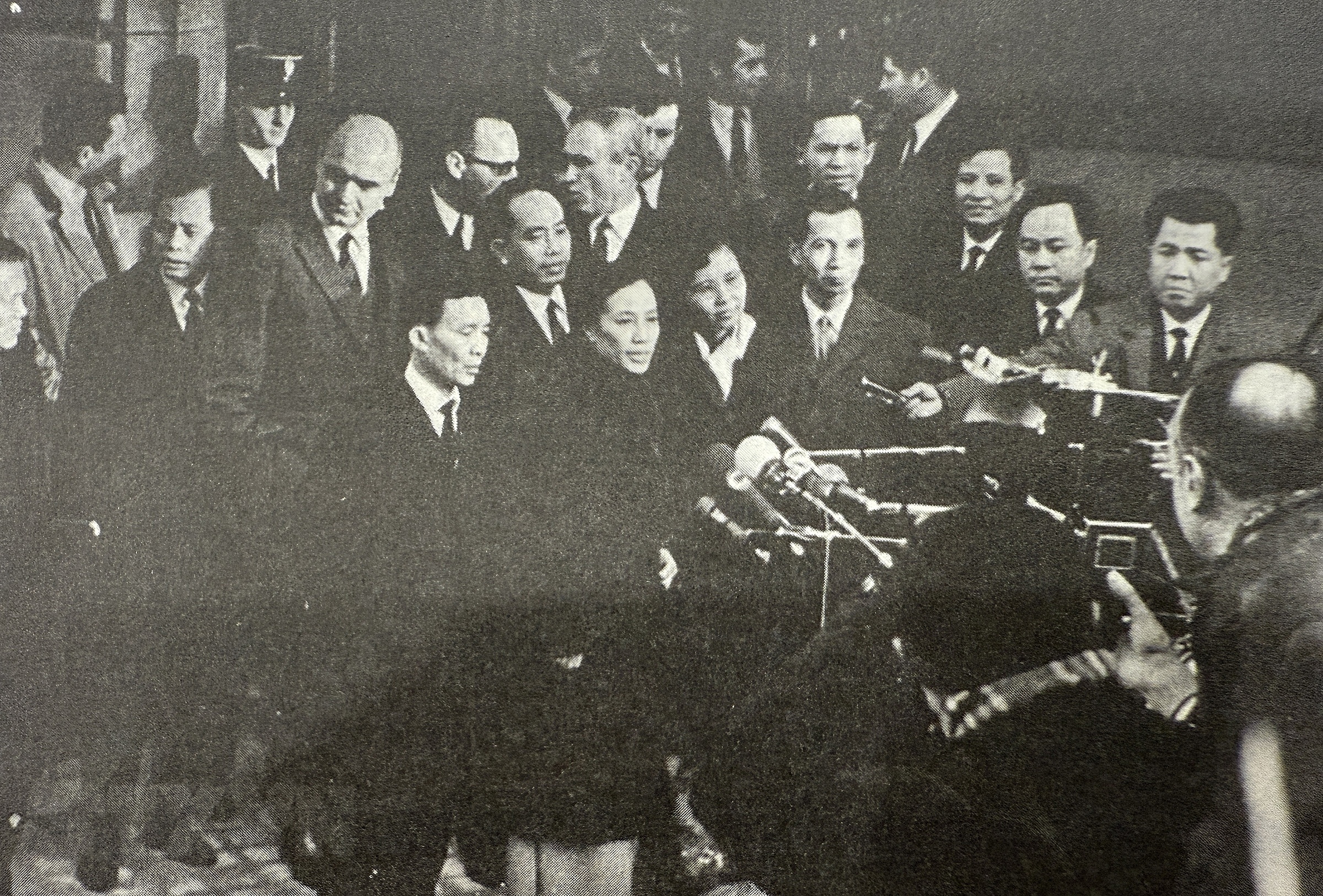 |
Nguyen Thi Binh answering journalists' questions after attending the first session discussing the procedures of the four delegations' conference in Paris, 1/1969. Archive photo
In 9/1970, the delegation of the Provisional Revolutionary Government presented a highly influential 8-point draft proposal at the Paris talks, demanding the complete withdrawal of American troops and the removal of Nguyen Van Thieu, Nguyen Cao Ky, and Tran Thien Khiem, to establish a provisional coalition government in the south.
Almost a year later, the delegation led by Binh presented a 7-point plan, requiring the US to withdraw all troops and release prisoners of war; the Saigon administration to resign, making way for a new government willing to negotiate with the Provisional Revolutionary Government to form a government of national reconciliation.
However, while the war in the south intensified, the Paris conference remained a "dialogue of the deaf," with each side presenting its own views and positions. In early 1972, Binh was instructed to issue a two-point statement: the withdrawal of US troops and the establishment of a three-component government of national reconciliation in the south, comprising the Provisional Revolutionary Government, the Saigon administration, and a third component.
When the US deployed B-52 bombers to attack Hanoi in late 1972, Binh returned to Hanoi, visiting the devastated Kham Thien Street and her two young children who were evacuated to Hung Yen town. Returning to Paris on 21/1/1973, Binh immediately held a press conference, declaring: "There is only one Vietnam, only one Vietnamese nation, and the Provisional Revolutionary Government is the representative of the people of the south."
"Madam Binh, dressed in a traditional Vietnamese ao dai made of green silk, looked very comfortable. At times, Madam Binh smiled, making her face even more radiant, answering reporters clearly and concisely, giving the impression of a lady full of courage and confidence," AFP described.
After four years of persistent struggle, on 23/1/1973, the Paris Peace Accords were initialed and officially signed four days later. On the official signing day, 27/1, Binh, representing the Provisional Revolutionary Government, was one of the four parties to sign the 32 agreement documents.
"Signing the historic Paris Agreement, I was deeply moved... I don't have enough words to express my endless gratitude to our compatriots and soldiers from north to south who accepted all sacrifices and fought bravely to achieve this great victory today," she wrote in her memoirs.
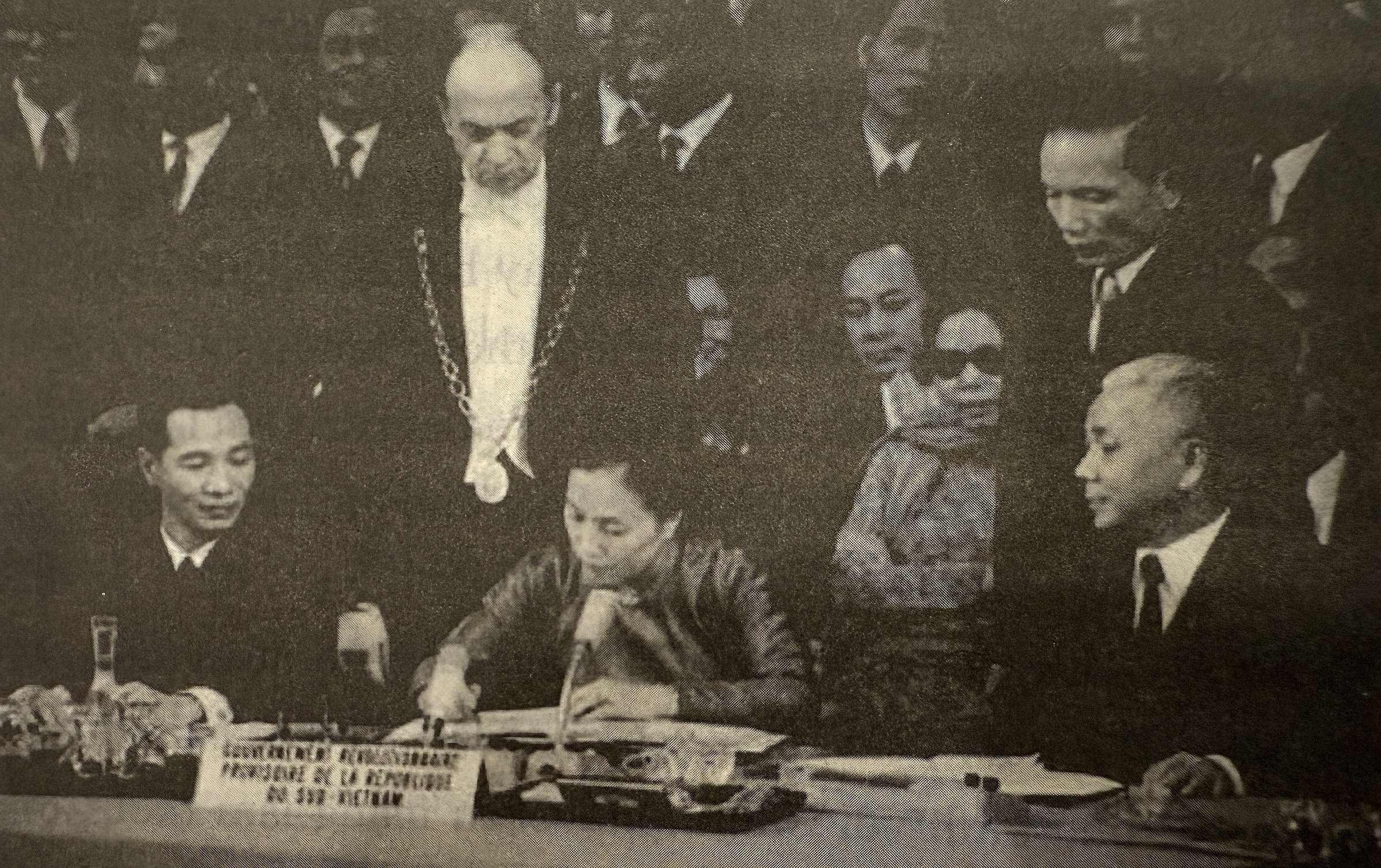 |
Nguyen Thi Binh signing the treaty recognizing the Paris Agreement, 27/1/1973. Archive photo
Vice president helps reduce sentences for many prisoners
After the reunification of the country, Nguyen Thi Binh served 11 years as minister of education and 5 years as deputy head of the Party Central Committee's Foreign Affairs Commission, concurrently chairing the National Assembly's Foreign Affairs Committee.
In early 1992, while in Ho Chi Minh City, General Secretary Do Muoi visited her and informed her of the Politburo's intention to nominate her for vice president in the next term. At 65, past the retirement age, she initially declined. However, thinking "if I do it, it's for the country, not for any other purpose," she accepted. During her two terms as vice president, she made substantial contributions to the nation, particularly in foreign affairs and justice.
From 1991, she participated in high-level conferences of the Francophonie. In a meeting with French President Jacques Chirac, she questioned why Vietnam was placed in the fourth tier of France's trade priority relations. President Chirac immediately instructed his assistant, saying, "There's no reason for that; Vietnam should be placed in the third tier immediately."
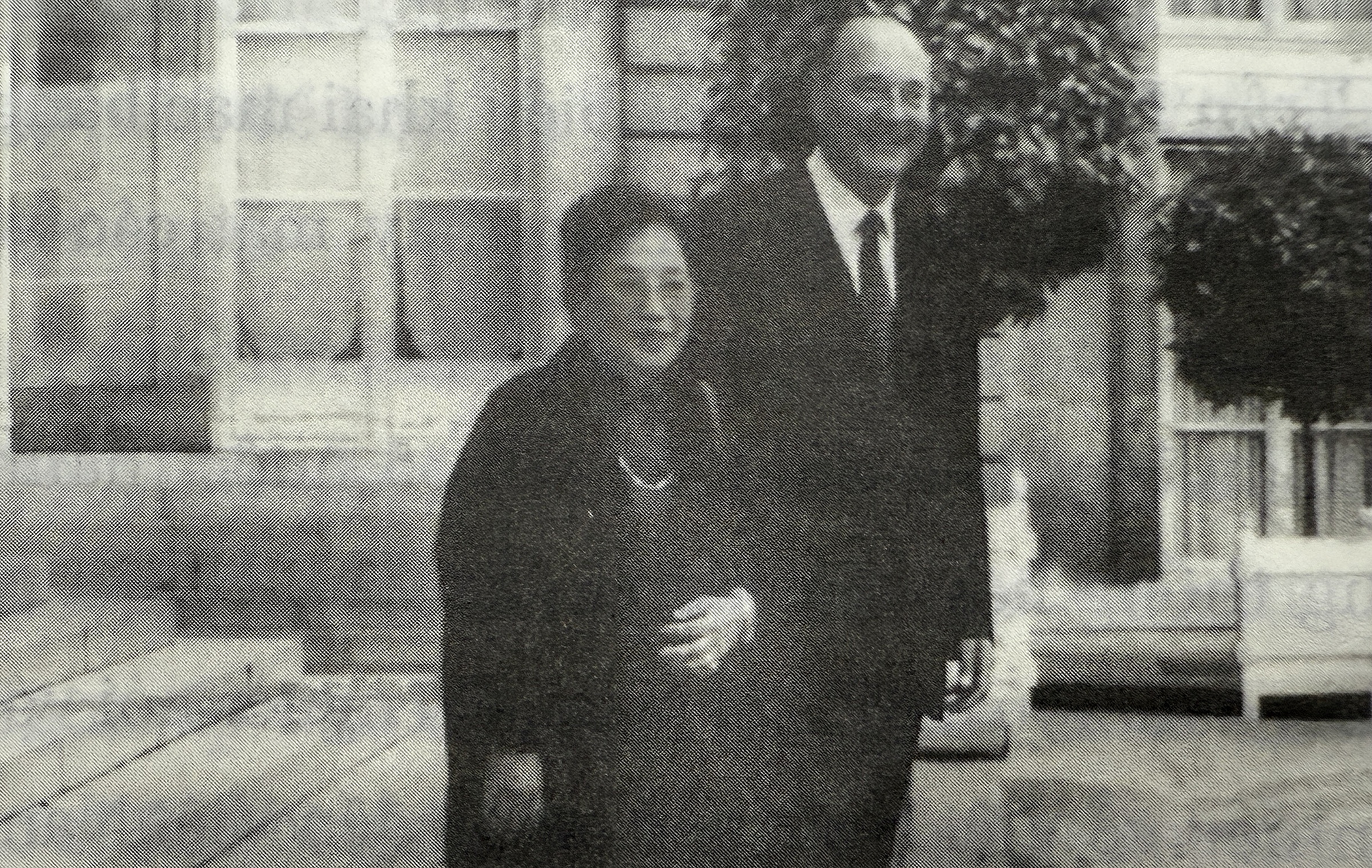 |
Vice President Nguyen Thi Binh and Jacques Chirac at the Summit, Hanoi, 1997. Archive photo
In 1994, during a trip to several African countries, Binh met with Jacques Diouf, president of the Food and Agriculture Organization (FAO), and discussed the global food situation. This conversation led to an initiative where Vietnam would send experts, FAO would provide most of the funding, and African countries would cover the experts' living expenses to boost food production in Africa. The idea was successfully implemented.
In the early 1990s, there were many complaints about the judicial system. In 1995, Binh was tasked with inspecting several localities. She then reported to the president on the current state of affairs and proposed a series of judicial reforms. She advocated for solutions to many specific problems.
Visiting the Ministry of Public Security's prison in Hanoi, she met a young man sentenced to death but held for over 6 years without execution due to his and his family's appeals, with the court repeatedly retrying the case without resolution. Binh recommended that if there wasn't sufficient evidence for a severe sentence, the punishment should be reduced, allowing him to live under less harsh conditions as a regular prisoner.
In Ho Chi Minh City, she visited the Cu Chi district prison and found many women detained for gambling, including street vendors with young children. She suggested to local authorities that they be reprimanded and released.
During prison visits, Binh often met with the oldest, youngest, female, or highly educated inmates to understand the reasons behind their crimes. At Xuan Moc prison, she encountered a man imprisoned for nearly 5 years. He had studied biophysics in the Soviet Union, but upon returning to Vietnam, he managed a company that incurred losses, leading to his conviction. Binh suggested the parole board review his case, and he was subsequently pardoned.
In 7/2002, Nguyen Thi Binh completed her second term as vice president.
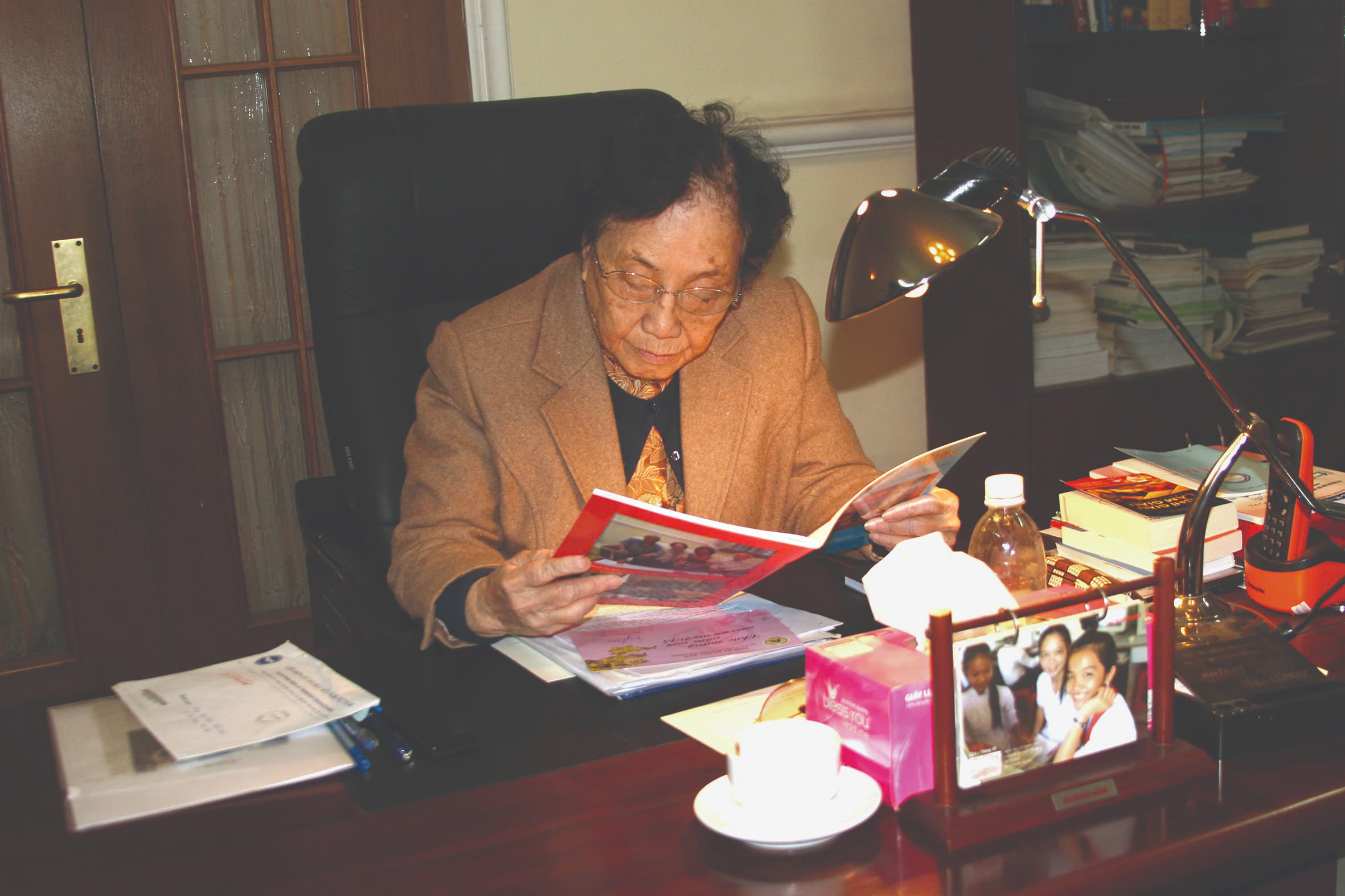 |
Former Vice President Nguyen Thi Binh at age 90, in 2017. Photo: National Political Publishing House - Truth
In retirement, Binh remained busy as president of the Vietnam Children's Fund, the Kovalevskaya Award Fund, and the Phan Chau Trinh Cultural Foundation. In 4/2003, she co-founded the Vietnam Peace and Development Fund, and almost a year later, became honorary president of the Vietnam Association of Victims of Agent Orange/Dioxin. She appeared at numerous domestic and international forums and scientific conferences, speaking on peace, educational development, disadvantaged children, and women's rights.
At the 50th anniversary of the signing of the Paris Peace Accords in 2023, Socorro Gomes Coelho, former president of the World Peace Council, recalled: "Madam Binh was considered one of our female icons. Small and graceful in her traditional Vietnamese ao dai, yet very firm in press conferences."
"Oh, Madam Binh, a wonderful Vietnamese woman, a courageous person. In our time, she was one of the shining examples we wanted to emulate," shared Corazon Valdez Fabros, in charge of peace and security at the Asia-Europe People's Forum and a member of the World Peace Council.
Visiting former Vice President Nguyen Thi Binh in 3/2025, Prime Minister Pham Minh Chinh expressed gratitude for her significant contributions to the cause of national liberation, construction, and defense of the Fatherland, including her time as foreign minister of the Provisional Revolutionary Government and head of its delegation at the Paris Peace Accords from 1969 to 1973.
Vu Tuan
References:
: Family, Friends and Country (National Political Publishing House - Truth)
: Heart for the Country (National Political Publishing House - Truth)



